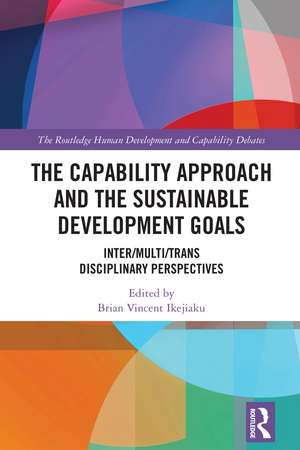The Capability Approach and the Sustainable Development Goals: Inter/Multi/Trans Disciplinary Perspectives: The Routledge Human Development and Capability Debates
Editat de Brian Vincent Ikejiakuen Limba Engleză Hardback – 26 iul 2024
The capability approach dictates that success should not be measured by economic indicators but by people leading meaningful, free, fulfilled, happy, or satisfied lives. Drawing from a range of disciplinary perspectives, this book argues that it is vital that the focus for the SDGs should shift to benefiting the most vulnerable. Case studies from across Asia, Africa, Latin America (Global South), and the United States, the United Kingdom, and Australia (Global North) consider how the capability approach can contribute as a practical framework to achieving the SDGs’ ambitions for social, economic, political, and legal progress.
Drawing on insights from a range of disciplines, this book will be of interest to researchers and practitioners from the fields of law, politics, international relations, criminology, international development, sociology, public policy, area studies, and others.
Preț: 1005.50 lei
Preț vechi: 1104.95 lei
-9% Nou
Puncte Express: 1508
Preț estimativ în valută:
192.42€ • 208.95$ • 161.64£
192.42€ • 208.95$ • 161.64£
Carte disponibilă
Livrare economică 02-16 aprilie
Livrare express 18-22 martie pentru 37.79 lei
Preluare comenzi: 021 569.72.76
Specificații
ISBN-13: 9781032598574
ISBN-10: 1032598573
Pagini: 342
Ilustrații: 46
Dimensiuni: 156 x 234 x 27 mm
Greutate: 0.66 kg
Ediția:1
Editura: Taylor & Francis
Colecția Routledge
Seria The Routledge Human Development and Capability Debates
Locul publicării:Oxford, United Kingdom
ISBN-10: 1032598573
Pagini: 342
Ilustrații: 46
Dimensiuni: 156 x 234 x 27 mm
Greutate: 0.66 kg
Ediția:1
Editura: Taylor & Francis
Colecția Routledge
Seria The Routledge Human Development and Capability Debates
Locul publicării:Oxford, United Kingdom
Public țintă
Academic and PostgraduateCuprins
Introduction Section One: General Conceptual and Theoretical 1. Sustainable Development, Capabilities, Hegemonic Forces and Social Risks: Extending the Capability Approach to Promote Resilience against Social Inequalities Section Two: Asia 2. Child Malnutrition and Energy Service Access in India 3. A Capability Approach Towards Achieving the Sustainable Development Goals 16.a: Prevent Violence and Combat Terrorism: Bangladesh as a Case Study 4. Nepalese Agriculture in Transition? High Value Agriculture and Changing Gender Roles in Eastern Nepal 5. Women’s (Micro)enterprise and the SDGs: Reframing Women’s Economic Development in Sri Lanka 6. Inclusive Conservation in Forests and Agriculture Landscape: A Capabilities-Oriented Approach for Sustainable Development Goals Section Three: Africa 7. Application of Capability Approach to Achieving Sustainable Development Goals in Nigeria: A Gendered Perspective 8. The Rule of Law, Good Governance, Mob Justice, and Sustainable Development in Africa: A Capability Approach with Case of Ghana 9. Refugee Youth and the Provision of Educational Capabilities Section Four: Latin America 10. The Relevance of Strong Institutions: an Insight into Child Justice System Protection in Argentina Based on the Capability and Socio-Legal Approaches 11. Access To Water And Sanitation At the Municipal Level in Brazil: A Challenging Path Towards Sustainable Development Goals 12. Social Policies in Response to Child Poverty (SDG1): the Case of Argentina 13. Evaluating the Progression and the Sustainability of SDGs in Brazil Using the Capability Approach Section Five: Cross-Country / Regional / Cross-Regional (with more than one country study) 14. Education and Sustained Poverty Escapes in Sub-Saharan Africa 15. The SDGs and the ‘Leave No One Behind’ Agenda in Middle Income Countries Section Six: Developed Countries (USA, UK, and Australia) 16. Livable Cities: Wealth for Human Flourishing 17. Capability Approach as a Tool for Achieving Sustainable Development Goal 3– Good Health and Wellbeing: A Case of the United Kingdom and Australia Conclusion
Notă biografică
Brian Vincent Ikejiaku gained his PhD from Keele University, UK, where he was a Dandelion Scholar. He is Senior Fellow of the Higher Education Academy, UK; he has taught in different UK Universities including Coventry University where he was Director of PG Law programme, and University of Bradford, where he was Director of Research and PGR Coordinator. He is an interdisciplinary scholar and one of the global leading scholars/experts in the field of International and Global Law (particularly international development law, and international law, international human rights, sustainable development law, and social justice). He is Editorial Member of the International Journal of Law and Society. His research cuts across law, politics/international relations, international development, and business. His work has gained impact with the UNESCO, ADB, LDi, and others. He is a Lifetime Fellow Member of International Society for Development and Sustainability (ISDS).
Descriere
This book demonstrates how the capability approach to human development can contribute to the realisation of the 2015 UN Sustainable Development Goals. With insights from various fields, this book will interest researchers and practitioners from law, politics, international relations, sociology, public policy, area and development studies.


